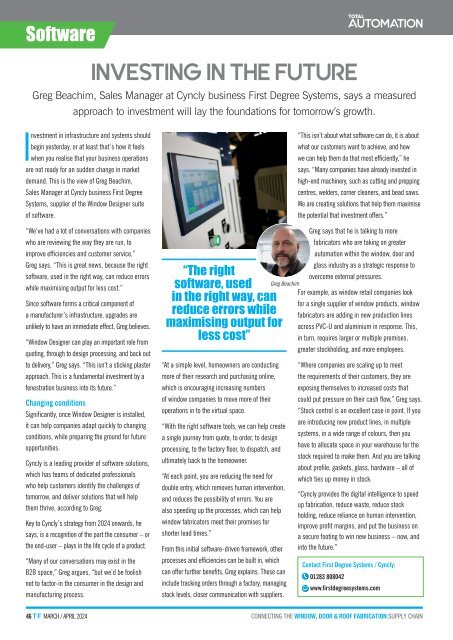March/April 2024
Create successful ePaper yourself
Turn your PDF publications into a flip-book with our unique Google optimized e-Paper software.
Software<br />
INVESTING IN THE FUTURE<br />
AUTOMATION<br />
Greg Beachim, Sales Manager at Cyncly business First Degree Systems, says a measured<br />
approach to investment will lay the foundations for tomorrow’s growth.<br />
Investment in infrastructure and systems should<br />
begin yesterday, or at least that’s how it feels<br />
when you realise that your business operations<br />
are not ready for an sudden change in market<br />
demand. This is the view of Greg Beachim,<br />
Sales Manager at Cyncly business First Degree<br />
Systems, supplier of the Window Designer suite<br />
of software.<br />
“We’ve had a lot of conversations with companies<br />
who are reviewing the way they are run, to<br />
improve efficiencies and customer service,”<br />
Greg says. “This is great news, because the right<br />
software, used in the right way, can reduce errors<br />
while maximising output for less cost.”<br />
Since software forms a critical component of<br />
a manufacturer’s infrastructure, upgrades are<br />
unlikely to have an immediate effect, Greg believes.<br />
“Window Designer can play an important role from<br />
quoting, through to design processing, and back out<br />
to delivery,” Greg says. “This isn’t a sticking plaster<br />
approach. This is a fundamental investment by a<br />
fenestration business into its future.”<br />
Changing conditions<br />
Significantly, once Window Designer is installed,<br />
it can help companies adapt quickly to changing<br />
conditions, while preparing the ground for future<br />
opportunities.<br />
Cyncly is a leading provider of software solutions,<br />
which has teams of dedicated professionals<br />
who help customers identify the challenges of<br />
tomorrow, and deliver solutions that will help<br />
them thrive, according to Greg.<br />
Key to Cyncly’s strategy from <strong>2024</strong> onwards, he<br />
says, is a recognition of the part the consumer – or<br />
the end-user – plays in the life cycle of a product.<br />
“Many of our conversations may exist in the<br />
B2B space,” Greg argues, “but we’d be foolish<br />
not to factor-in the consumer in the design and<br />
manufacturing process.<br />
“The right<br />
software, used<br />
in the right way, can<br />
reduce errors while<br />
maximising output for<br />
less cost”<br />
“At a simple level, homeowners are conducting<br />
more of their research and purchasing online,<br />
which is encouraging increasing numbers<br />
of window companies to move more of their<br />
operations in to the virtual space.<br />
“With the right software tools, we can help create<br />
a single journey from quote, to order, to design<br />
processing, to the factory floor, to dispatch, and<br />
ultimately back to the homeowner.<br />
“At each point, you are reducing the need for<br />
double entry, which removes human intervention,<br />
and reduces the possibility of errors. You are<br />
also speeding up the processes, which can help<br />
window fabricators meet their promises for<br />
shorter lead times.”<br />
From this initial software-driven framework, other<br />
processes and efficiencies can be built in, which<br />
can offer further benefits, Greg explains. These can<br />
include tracking orders through a factory, managing<br />
stock levels, closer communication with suppliers.<br />
“This isn’t about what software can do, it is about<br />
what our customers want to achieve, and how<br />
we can help them do that most efficiently,” he<br />
says. “Many companies have already invested in<br />
high-end machinery, such as cutting and prepping<br />
centres, welders, corner cleaners, and bead saws.<br />
We are creating solutions that help them maximise<br />
the potential that investment offers.”<br />
Greg says that he is talking to more<br />
fabricators who are taking on greater<br />
automation within the window, door and<br />
glass industry as a strategic response to<br />
overcome external pressures.<br />
Greg Beachim<br />
For example, as window retail companies look<br />
for a single supplier of window products, window<br />
fabricators are adding in new production lines<br />
across PVC-U and aluminium in response. This,<br />
in turn, requires larger or multiple premises,<br />
greater stockholding, and more employees.<br />
“Where companies are scaling up to meet<br />
the requirements of their customers, they are<br />
exposing themselves to increased costs that<br />
could put pressure on their cash flow,” Greg says.<br />
“Stock control is an excellent case in point. If you<br />
are introducing new product lines, in multiple<br />
systems, in a wide range of colours, then you<br />
have to allocate space in your warehouse for the<br />
stock required to make them. And you are talking<br />
about profile, gaskets, glass, hardware – all of<br />
which ties up money in stock.<br />
“Cyncly provides the digital intelligence to speed<br />
up fabrication, reduce waste, reduce stock<br />
holding, reduce reliance on human intervention,<br />
improve profit margins, and put the business on<br />
a secure footing to win new business – now, and<br />
into the future.”<br />
Contact First Degree Systems / Cyncly:<br />
01283 808042<br />
www.firstdegreesystems.com<br />
46 T F MARCH / APRIL <strong>2024</strong> CONNECTING THE WINDOW, DOOR & ROOF FABRICATION SUPPLY CHAIN
















